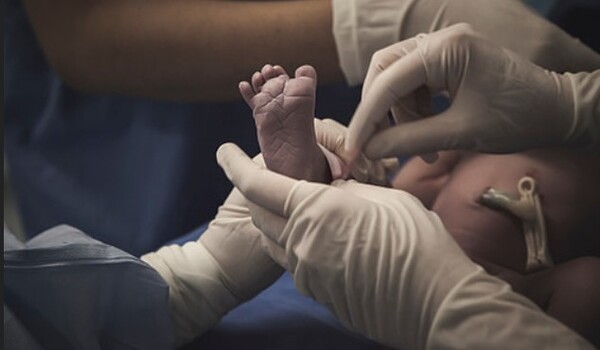
A court has ordered a hospital to pay nearly 400 million won ($296,000) in compensation for the death of a newborn baby due to a delayed emergency C-section.
In a recent damage claim against a delivery hospital, the Seoul Central District Court found the medical staff negligent and ordered it to pay 396,828,462 won and delayed interest to the mother.
The couple who filed the lawsuit, initialized as A, gave birth at a hospital run by a doctor, initialized as B, but their child died in about 20 minutes. According to the autopsy conducted by the National Forensic Science, the cause of death was meconium inhalation syndrome and perinatal gashes that occurred during the delivery process.
Mr. and Mrs. A filed a lawsuit against Doctors C and D in charge of the delivery, and the hospital operator, Dr. B, demanding 616.65 million won in damages and delayed payment of interest. They claimed that their child died due to the negligence of the delivery staff and that the medical workers failed to fulfill their duty of explanation.
"The fetal heart rate was continuously lowered in the NST (non-stress test) received at the hospital, and even when fetal distress was suspected, the doctors did not immediately attempt to deliver the fetus by performing an emergency cesarean section and left the fetus unattended,” the couple said. “At the time of birth, the child was having trouble breathing due to meconium aspiration syndrome, but no endotracheal intubation or epinephrine injection was administered.”
The hospital denied any delay in treatment. It said that the NST test was first observed at 1:07 a.m. on the day of the incident, but it was not until 3:30 a.m. that the mother was identified as "Category III," a condition requiring a cesarean section, about two hours later. The decision to perform a C-section was made by the medical team at 3:52, 20 minutes later. She was taken to the operating room at 4:30 and gave birth 25 minutes later at 4:55.
The hospital had only one operating room, and the doctor in charge of the delivery, Dr. C, was performing a C-section on another woman at 2:50 a.m., so he was unable to operate immediately. Even if she had been transferred to another hospital under the Covid-19 situation, it was difficult to say that the surgery would have been performed immediately.
The tribunal found that the child died due to the medical staff's negligence and recognized the liability for damages. It accepted the opinion of the Korea Medical Dispute Mediation and Arbitration Agency, which appraised the case. The arbitrator's opinion was that there was a delay in the entire process, including when the uterine contraction drug oxytocin was stopped.
"On the day of the incident, a variable fetal heart rate first appeared at 1:07 a.m. and was confirmed to be sustained at 1:15. Normally, by 1:20, oxytocin should have been discontinued and heart rate changes checked. The decision to perform a cesarean section should have been made at least by 2:00,” the appraising doctor at the agency said.
The decision to discontinue oxytocin was made by Dr. C at 2:10 a.m. in labor. C continued to administer oxytocin, judging the fetal status to be a declining fetal heart rate but stopped when she felt strong contractions.
"As of 2:10, when oxytocin was stopped, there was a variable fetal heart rate decline time of more than 60 seconds and a fetal heart rate of less than 80 beats from 2:06 to around 2:35," the medical examiner said. “In a situation where the fetal distress was getting worse, the decision to perform a cesarean section should have been made at least by 2:35."
Besides, Category III means that the risk of fetal death is significantly increased, with clear and irreversible consequences. It is customary to decide on surgery before Category III, he added.
The tribunal also did not accept the medical staff's defense that the hospital's internal and external conditions made it difficult to perform an immediate C-section. There was also no evidence that other hospitals were consulted.
"It was around 2:50 a.m. on the day of the incident that Dr. C moved for another maternity operation. The medical staff should have decided whether or not to perform a C-section at least before then, given the results of the assessment. If there was only one operating room, A should have been moved immediately (if simultaneous operations were difficult), but the medical staff did nothing until the other mother's operation was over," it said.
The tribunal concluded by saying, "The fetus showed few unusual symptoms at the time of Ms. A's admission and there were no other causes of death before or after delivery. Based on her condition at birth and the circumstances leading up to its death, it can be concluded that persistent hypoxia and fetal distress occurred during the delivery process, but the delivery staff did not take appropriate measures, leading to its death."
However, it did not find any negligence in the post-delivery care or breach of the medical staff's duty of explanation.
Accordingly, the court awarded the family 396,828,462 won in damages and dismissed the remaining claims.

